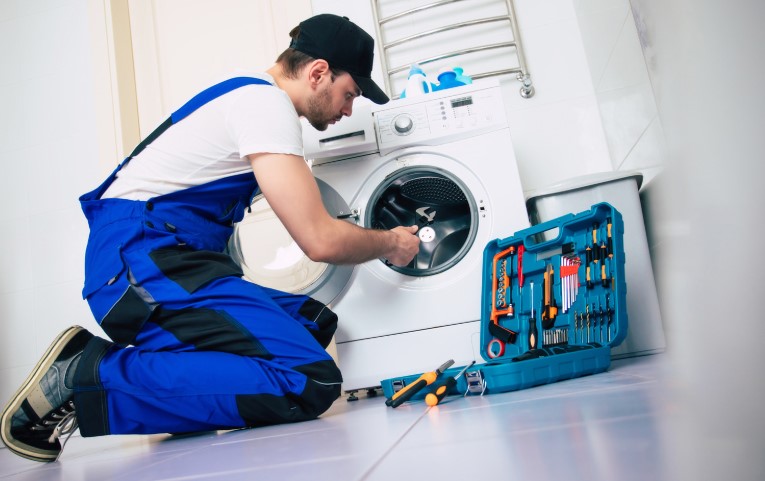- What Kind of Noise Is Your Washing Machine Making?
- Why Is My Washing Machine So Loud?
- How Can I Fix a Noisy Washing Machine at Home?
- When Should I Call a Repair Technician?
- How Can I Prevent My Washing Machine From Being Loud in the Future?
- Comparison Table – Common Noises vs. Causes vs. Fixes
- Quick Checklist to Diagnose a Noisy Washing Machine
- Final Thoughts: Don’t Ignore the Noise
Washing machines are essential to my daily routine, but nothing’s more frustrating than hearing mine suddenly roar to life like a jet engine.
If you’ve found yourself wondering “why is my washing machine so loud?”, you’re not alone. Let me guide you through understanding the noises, spotting the causes, and figuring out what to do next.
What Kind of Noise Is Your Washing Machine Making?
Before I can fix anything, I need to identify the noise. Different sounds usually point to different problems.
Is it a banging or thumping sound?
This is often the result of an unbalanced load. I’ve noticed it usually happens when heavy items like towels or bedding clump on one side of the drum.
My washer ends up dancing across the floor!
Do you hear a grinding or scraping noise?
That’s typically linked to drum bearing problems or a foreign object stuck inside. Coins, hairpins, or even underwires can cause that nasty metallic sound.
Is it squealing or high-pitched?
A high-pitched squeal might mean there’s an issue with the drive belt or motor, especially during the spin cycle.
Is it vibrating excessively?
When my washer starts vibrating like crazy, it’s usually because it’s on an uneven surface or the internal shock absorbers are failing.

Why Is My Washing Machine So Loud?
Now to the big question — why is my washing machine so loud in the first place?
Could it be an unbalanced load?
Absolutely. If clothes clump together, especially bulky items, it throws the drum off balance. This can cause banging and violent shaking.
Are the drum bearings worn out?
Over time, washing machine bearings wear down, creating a grinding or rumbling noise. I’ve had to replace mine once by removing the drum— it’s a fairly involved job but crucial.
Is something stuck in the drum or filter?
Even something as small as a coin or button can get lodged between the drum and the outer tub, causing awful sounds and potential damage.
Are the shock absorbers or suspension rods faulty?
These parts absorb the movement of the drum. If they’re worn out, your washer may shake more violently than it should.
Could it be a motor or drive belt issue?
If your washer makes strange noises during the spin cycle, it could be a faulty motor or slipping drive belt. I once had to tighten the belt on mine — a simple fix but very effective.
How Can I Fix a Noisy Washing Machine at Home?
Before calling in the pros, I usually run through a few simple checks and fixes of your question on why is my washing machine so loud:
Step-by-step DIY fixes for common issues:
- Rebalance the load – Open the door and rearrange the items.
- Check for foreign objects – Look inside the drum as well as the washers’s filter.
- Tighten loose parts – Check screws and fittings.
- Level the washer – Use a spirit level & adjust the feet.
Tools and materials you might need:
- Screwdriver set
- Replacement bearings or belts (if needed)
- Anti-vibration pads
- Spirit level
Simple checks before calling a professional:
- Is the machine level and stable?
- Does the noise only happen during spin?
- Is the load balanced?

When Should I Call a Repair Technician?
I believe in DIY — to a point. Here’s when I step back and call an expert:
Signs it’s more than a DIY job:
- Persistent grinding even after cleaning
- Water leaks with strange noises
- Smoke or burning smell
What kind of repairs cost more than replacement?
| Issue | Repair Cost Estimate (UK) | Worth Repairing? |
| Drum bearing replacement | £100–£150 | Often, yes |
| Motor replacement | £150–£250 | Only if machine is recent |
| Suspension repair | £80–£120 | Usually worth fixing |
If the repair cost is more than 50% of a new washer, I personally consider replacing it.
How Can I Prevent My Washing Machine From Being Loud in the Future?
I’ve learned that prevention saves time, money, and stress.
Regular maintenance tips:
- Clean the filter every month
- Check the drum for objects after each wash
- Keep the washer on a level surface
How to load your washer the right way:
- Mix heavy and light items
- Avoid overloading
- Distribute clothes evenly
Tools and accessories to reduce noise:
- Anti-vibration pads – These go under the machine
- Drip trays – Helps reduce movement on tile or laminate
- Shock absorber kits – Available online for DIY replacement

Comparison Table – Common Noises vs. Causes vs. Fixes
| Type of Noise | Likely Cause | Suggested Fix |
| Banging | Unbalanced load | Rearrange clothes, balance load |
| Grinding | Worn bearings | Replace drum bearings |
| Squealing | Drive belt or motor issues | Tighten or replace belt |
| Vibrating | Uneven floor or faulty suspension | Use anti-vibration pads |
Quick Checklist to Diagnose a Noisy Washing Machine
- Is the washer level?
- Is the load balanced?
- Have I checked the filter and drum for objects?
- Are there any visible signs of wear or leaks?
- Do the noises happen during specific cycles?
Final Thoughts: Don’t Ignore the Noise
If you’re like me and rely heavily on your washer, it’s worth giving it a little attention when it starts making noise.
Loud washing machine issues don’t always mean something major — sometimes it’s just a sock stuck in the wrong place or an uneven floor.
But when in doubt, it’s always better to act early. A quick fix on why is my washing machien so loud, now could save you from a major repair later.


0 Comments